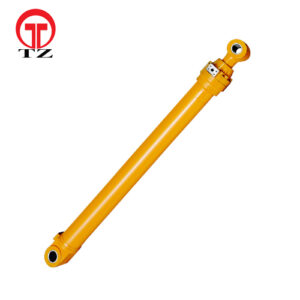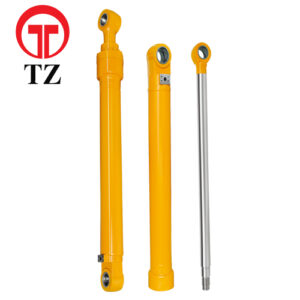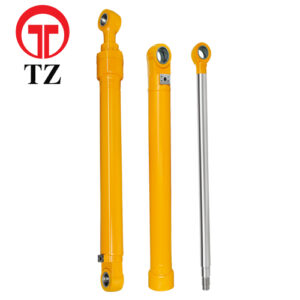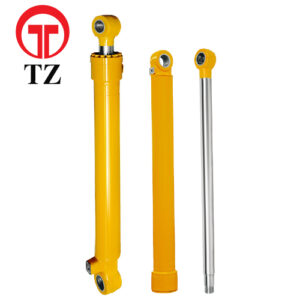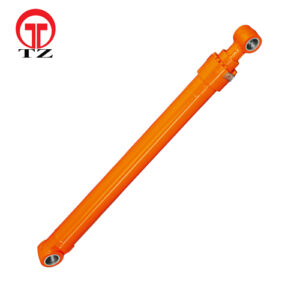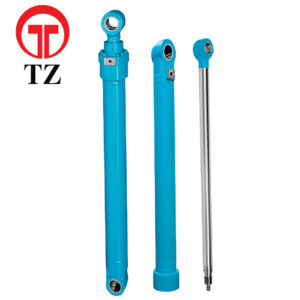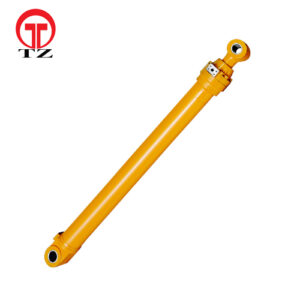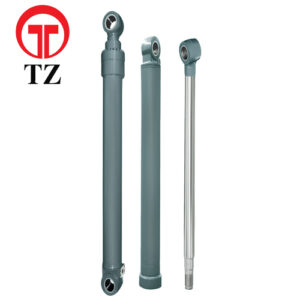An oil cylinder, also known as a hydraulic cylinder, is a mechanical component used to convert fluid power into linear mechanical force and motion. It consists of a cylinder barrel, piston, piston rod, and seals.
Oil Cylinder For Excavators
In the context of excavators, hydraulic cylinders are commonly used to power the boom, arm, and bucket. These cylinders help the excavator to perform tasks such as digging, lifting, and moving heavy loads.
The size and specifications of the hydraulic cylinders used in an excavator depend on the size and weight of the machine, as well as the tasks it is designed to perform. Larger excavators typically have more powerful hydraulic systems, which allow for more forceful movements and faster cycle times.
Oil Cylinder Excavators maintenance
Proper maintenance and care of hydraulic cylinders is essential to ensure their longevity and reliable operation. Regular inspections, cleaning, and replacement of worn parts can help prevent damage and extend the life of the cylinders.
-
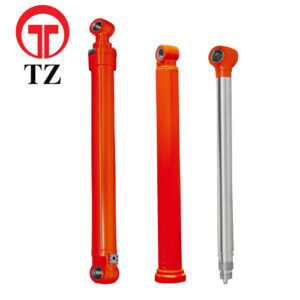 Replacement Hydraulic Boom Cylinder for S225 DOOSAN Excavator
Replacement Hydraulic Boom Cylinder for S225 DOOSAN Excavator -
 E374DL CAT Excavator Boom Cylinder Assy
E374DL CAT Excavator Boom Cylinder Assy -
 R250-7 HYUNDAI Excavator Boom Cylinder Assy
R250-7 HYUNDAI Excavator Boom Cylinder Assy -
 R480-9 HYUNDAI Excavator Boom Cylinder Assy
R480-9 HYUNDAI Excavator Boom Cylinder Assy -
 PC200-8 KOMATSU Excavator Boom Cylinder Assy
PC200-8 KOMATSU Excavator Boom Cylinder Assy -
 ZX870-5G HITACHI Excavator Boom Cylinder Assy
ZX870-5G HITACHI Excavator Boom Cylinder Assy -
 SK350-8 KOBELCO Excavator Boom Cylinder Assy
SK350-8 KOBELCO Excavator Boom Cylinder Assy -
 E325B CAT Excavator Boom Cylinder Assy
E325B CAT Excavator Boom Cylinder Assy -
 EC700B VOLVO Excavator Boom Cylinder Assy
EC700B VOLVO Excavator Boom Cylinder Assy
Proper maintenance of oil cylinders for excavators
Proper maintenance of oil cylinders for excavators is critical to ensure their safe and reliable operation. Here are some maintenance tips to keep in mind:
Regular inspections: Inspect the oil cylinders regularly for signs of damage or wear. Look for leaks, dents, or scratches on the cylinder body or piston rod. Also, check for any signs of corrosion, rust, or pitting.
Keep it clean: Dirt, dust, and debris can cause significant damage to oil cylinders. Therefore, it is important to keep them clean at all times. Use a high-pressure washer to clean the exterior of the cylinder, and make sure the piston rod is always free from dirt and debris.
Lubrication: Regularly lubricate the cylinder with a high-quality hydraulic fluid. Use the recommended type of fluid and ensure that the fluid is at the correct level.
Replace damaged seals: The seals in the oil cylinder play a crucial role in preventing leaks and keeping the hydraulic fluid inside the cylinder. If you notice any damage to the seals, replace them immediately.
Use the correct parts: When replacing parts of the oil cylinder, use only genuine parts from the manufacturer. Using incorrect parts can cause damage to the cylinder and put the operator’s safety at risk.
Regular servicing: It is important to have the oil cylinder serviced regularly by a qualified technician. They can check for any signs of wear or damage that may not be visible during a regular inspection.
By following these maintenance tips, you can help ensure that your excavator’s oil cylinders are always in good condition and working safely and reliably.

